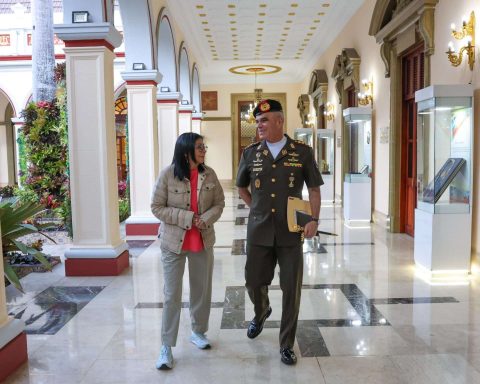
One of the central issues that the Political System Commission of the Constitutional Convention (CC) will review is the formula that will be included in the new Constitution on the political regime. Within the CC there is a transversal agreement that the current system cannot continue, which they describe as “hyper-presidentialism.” Most of the proposals include new positions, but also a modification in the powers of Congress.
In general, there are coincidences in moderating presidentialism, for example, through a second figure, parity, called by some as Vice President, Minister of Government or Chief of Staff. There is an obvious finding that the term of the Executive lasts 4 years, with the possibility of immediate re-election, but without exceeding 8 years of mandate throughout his life. There is division regarding Congress, because while some point to the unicameral, others advocate maintaining the bicameral, and some to maintain it with modifications, for example, through a Territorial Chamber that replaces the Senate.
Here is a summary of the proposals submitted yesterday:
-Frente Amplio, Chile Digno, Constituent Social Movements, Constituent People and Non-Neutral Independents
In this broad spectrum of constituents there were some alliances and also separate proposals. In the case of the presidential system, the Broad Front (FA), Constituent Social Movements (MSC), Non-Neutral Independents (INN) and the Social Green Regionalist Federation (FRVS) joined in an initiative, albeit with particular nuances, that incorporates the figure of the Minister of Government, in charge of interministerial political coordination and with Congress, in a joint duo with the President, who will appoint the person in said position.
The administration period is 4 years with the possibility of re-election, with a cabinet that has members of indigenous peoples and that maintains the parity character. The President leads the administration of the State and there is a Minister of Government in charge of leadership and interministerial and legislative political coordination.
Regarding the Communist Party, presented a proposal for “a rebalancing of powers” and a “attenuated presidentialism”, where there is a significant transfer of powers to the future Congress -which is characterized as unicameral and multinational-, such as having initiative, for example, in tax matters, where can increase resources during the Budget discussion.
On the second figure, they propose the position of Vice President, in a parity formula with the President, which allows the redistribution of power in gender equality. In the attributions, the President will have the head of the State and the Government. It includes mechanisms of direct democracy, such as the possibility of promoting a recall mandate for the President through popular initiative.
Regarding the Legislative proposal, the FA, MSC, Pueblo Constituent and Chile Digno (PC + FRVS) promoted a joint motion, which is summarized in a Unicameral and Plurinational Congress, with 205 members, in a mixed electoral system, with proportional seats. to the population.
-Socialist Collective: reformed presidentialism and Territorial Chamber
They are committed to “reforming presidentialism”, with modifications in its powers. For example, he will not be able to pardon and will be the Commander-in-Chief of the Armed Forces, “both in times of war and in times of peace.” They postulate that the presidential period lasts 4 years, with the possibility of a re-election. “We are proposing a formula that balances power between the Executive and Congress,” said the constituent Ricardo Montero.
In addition, it creates the position of the Vice Presidency, “which will be elected together with the Presidency in a joint formula.” As for possible dismissals, the quorum to approve a constitutional accusation decreases, and it must be approved by three-fifths of the Territorial Assembly Members.
That last position is the new Chamber proposed by the Socialist collective, which would replace the Senate, maintaining the Chamber of Deputies and Deputies. A Congress, moreover, parity and plurinational.
The motion contemplates the popular initiative of Law, that is to say, that it will be the citizens who can present projects to be discussed in Congress, with 100 thousand signatures. In addition, it lowers the minimum age to enter the Lower House and this new Territorial Chamber to 18 years.
-Reserved Seats: Chief of Staff and Plurinational Congress
The proposal was presented by the Mapuche constituent Rosa Catrileo, and supported by other reserved seats. In the core, it proposes a presidential system, with the creation of the figure of the Chief of Staff, who is ratified by the Territorial Chamber. The term of the Executive would be 4 years with immediate re-election.
It establishes for the Congress a Bicameral system, a Plurinational Parliament. Reform, yes, the current bicamerality, since it installs a Legislative Assembly Chamber and a Territorial Chamber. The latter incorporates 3 representatives per region, plus seats representing indigenous territories. The Legislative Assembly would be the origin of the law. Both terms will last 4 years, and both Houses must have reserved seats.
Proposes a reduction of the parliamentary diet to 50 UTM.
-Plurinational and Popular Coordinator: Vice President and Unicameral Congress
The Coordinator, which brings together reserved seats, independents and former members of the People’s List, is also committed to a President-Vice President duo that is equal, elected jointly, with 4 years of administration and the possibility of 1 re-election period.
The Presidency of the Republic exercises the function and Executive Power, in this lies the head of State and Government and, therefore, the Responsibility of the Public Administration. The Vice President of the Republic is the assistant authority of the Presidency, who will subrogate him in his faculties and will carry out the tasks in accordance with what is expressly stated in the Constitution and the laws in force.
Regarding the Congress, they establish a unicameral system and it is made up of the Plurinational Chamber of Deputies, which is accompanied by the Macro-regional Congresses. Both instances have oversight tools to control the acts of the National Executive Branch and the Regional Governors, respectively.
In all instances of the Legislative Power, the presence of the original nations will be taken care of, through reserved seats, through the mechanisms established by the Constitution and the laws. It also lowers the age to enter Congress and leaves it at 18 years.
-Collective of Approval: Minister of Government and asymmetric bicameral Congress
He also favors a duo of President – Minister of Government, with a duration of 4 years and the possibility of immediate re-election for another term. The President of the Republic carries out the tasks of the Government and administration of the State, maintaining internal public order and security, through and with the collaboration of the Minister of Government and the Cabinet of Ministers.
The President of the Republic will appoint the Minister of Government, who will be in charge of executing the policy of the Government and of the public administration, the coordination of the Cabinet and the relationship with the National Congress. His name must be ratified by the Legislature.
The Congress will be bicameral and asymmetric, where the Chamber of Deputies will be representative and political, and the Senate will be territorial, representing the regions and with more limited legislative powers. It also includes the popular law initiative.
Among the novelties, the proposal states that “the President of the Republic may dissolve the Chamber of Deputies only once during his term. This power may not be exercised in the last year of the Government. Likewise, the Chamber of Deputies may “censure the Minister of Government only once in the same presidential period.
-RN – Evópoli: Presidentialism of cooperation and Territorial Senate.
This proposal established that the President of the Republic maintains the functions of Head of State and Head of Government and will be elected directly by the citizenry.
It also incorporated new positions to the Executive, but 2, unlike the majority that only incorporated a complementary position to that of the President of the Republic.
Creates the figure of the Vice President, elected together with the President of the Republic. Both will last four years in their functions and may be re-elected only once in their same positions. The Vice President will preside over the Senate, will have the right to speak and vote only to settle ties, and will be a joint duo.
The figure of Minister Chief of Cabinet is established, appointed by the President of the Republic, who will be in charge of coordinating the work that corresponds to the Ministers, as well as the relationship of the Executive with the Chamber of Deputies and Deputies.
As for Congress, it maintains a bicameral system, with a Chamber of Deputies and Deputies, and a Territorial Senate, with powers in matters of decentralization and in the appointment of State authorities.
-UDI: balanced presidentialism
One of the premises is to improve the coordination between the Executive and the Legislative. It also proposes the figure of the Joint Vice Presidency, to deconcentrate power. The President and Vice President will last 4 years in office, with the possibility of immediate or subsequent reelection. The idea is that “in no case may they hold the position for more than 8 years in total.”
They propose to eliminate the power of the President to grant private pardons and the statute of former Presidents of the Republic is eliminated. In addition, it maintains the two current Chambers in Congress. Ends the incompatibility of the position of parliamentarian and minister, increases the supervisory power of the Chamber of Deputies and Deputies, among other points.
Also, the constitutional accusation against the National Prosecutor for notable neglect of his duties is allowed, includes the popular initiative of law and creates a Council for the Evaluation of Laws and Public Policies.
–
















